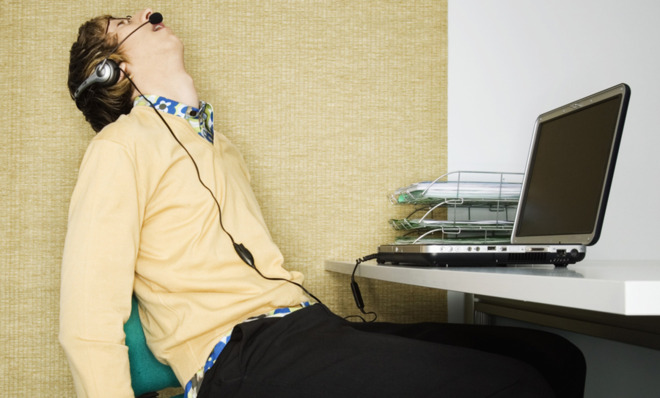How to take the perfect nap, according to science
Zzzzzzzzzzzzzz

A free daily email with the biggest news stories of the day – and the best features from TheWeek.com
You are now subscribed
Your newsletter sign-up was successful
You're probably getting sleepy just reading this. It's already been a long day at work, and maybe, just maybe, you feel compelled to shut your eyes just for a few minutes.
Hey, don't feel guilty. That nap compulsion is in your nature. Indeed, 85 percent of mammals are meant to sleep in short spurts throughout the day, according to the National Sleep Foundation.
What we don't know about the role of sleep in our lives could surely fill volumes of books. But we do know that sleep is very, very good for us — and that includes napping.
The Week
Escape your echo chamber. Get the facts behind the news, plus analysis from multiple perspectives.

Sign up for The Week's Free Newsletters
From our morning news briefing to a weekly Good News Newsletter, get the best of The Week delivered directly to your inbox.
From our morning news briefing to a weekly Good News Newsletter, get the best of The Week delivered directly to your inbox.
First, a quick refresher. There are two kinds of sleep: rapid eye movement (REM) and non-REM (NREM). NREM occurs in four stages, throughout which your physiological activities slow down. Stage 1 begins with feeling drowsy while your brain and muscle activities begin to dial down. Stage 2 builds on the previous stage, but your eye movements stop, heart rate slows, and your temperature decreases. Stages 3 and 4 — also known as slow wave sleep — is when your blood pressure lowers, your breathing slows, and your body temperature drops even further. Your body no longer moves.
During REM sleep, however, your brain is very active. Breathing may become more rapid, irregular, and shallow. Your eyes may move even though they are shut. Your heart rate increases and your blood pressure can rise. In addition, your limbs may be immobile. Though it sounds like something out of a nightmare, it's actually during this period of sleep that you dream and sort out your experiences throughout the day.
If you don't get enough nighttime shuteye, you're probably going to be hankering for a nap. "[People usually nap] because they have not gotten enough sleep at night, or the sleep they have gotten is poor and disrupted," Joyce Walsleben, an associate professor at the NYU School of Medicine, told The Week.
But how do you take the perfect nap?
A free daily email with the biggest news stories of the day – and the best features from TheWeek.com
First, aim for the afternoon. The National Sleep Foundation also suggests making sure your sleep environment is calm and peaceful. The temperature should be comfortable, and noise and light should be kept to a minimal level. And make sure you are actually sleeping: While just resting in bed may make you feel better, it's not going to refresh you as much as a nap will.
The perfect nap needn't be long, either.
"Twenty minutes keeps you from upsetting your schedules, getting into deeper sleep, and waking up groggy and refreshing you enough to continue safely," Walsleben said.
She added that if you don't have enough time to sleep in one chunk, napping throughout the day can have the same effect of getting a full night's rest. You just need to get enough sleep to get rid of your tired feeling.
And guess what? Napping is really good for you. One study in the Journal of Sleep Research suggested that napping is tied to better memory recall. Subjects were asked to remember a list of 30 words after either 60 minutes of napping or doing an activity. People who took a nap did significantly better. The boosted results were even observed when the subjects were just allowed to nap for six minutes.
Harvard sleep researcher Robert Stickgold says napping also helps with problem solving abilities. His studies have shown that people who take naps have an easier time separating facts from the extemporaneous clutter in their minds. If the person reaches REM phase in their nap, they'll have an easier time making connections between ideas.
And a study from NASA on 747 pilots showed that subjects who were allowed to nap — on average 25.8 minutes a day — were 16 percent more vigilant when it came to reaction time and 34 percent more likely not to have lapses in judgment compared to those who didn't nap.
Another study on physicians and nurses who were working 12-hour shifts showed that those who were given 40 minutes to nap had fewer performance lapses, more vigor, less fatigue, and less sleepiness than their counterparts who powered through.
Got it? Now go take a nap.
Michelle Castillo is a freelance writer and editor and a pop culture junkie. Her work has appeared in TIME, the Los Angeles Times and CBS News.
-
 The broken water companies failing England and Wales
The broken water companies failing England and WalesExplainer With rising bills, deteriorating river health and a lack of investment, regulators face an uphill battle to stabilise the industry
-
 A thrilling foodie city in northern Japan
A thrilling foodie city in northern JapanThe Week Recommends The food scene here is ‘unspoilt’ and ‘fun’
-
 Are AI bots conspiring against us?
Are AI bots conspiring against us?Talking Point Moltbook, the AI social network where humans are banned, may be the tip of the iceberg